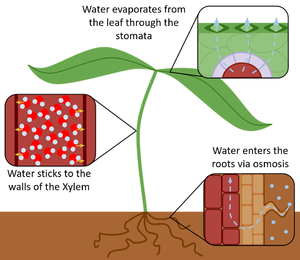Difference between revisions of "Transpiration"
(→Meaning) |
(→About Transpiration) |
||
| Line 9: | Line 9: | ||
: [[Water]] is lost from the [[plant]] through the [[stomata]], so it is important for the [[plant]] to be able to close the [[stomata]] to control [[water]] loss. | : [[Water]] is lost from the [[plant]] through the [[stomata]], so it is important for the [[plant]] to be able to close the [[stomata]] to control [[water]] loss. | ||
: If too much [[water]] is lost through [[transpiration]] the [[plant]] may begin to wilt. | : If too much [[water]] is lost through [[transpiration]] the [[plant]] may begin to wilt. | ||
| + | : The rate of [[transpiration]] can be measured using a [[potometer]]. | ||
| + | |||
===Factors Affecting Transpiration=== | ===Factors Affecting Transpiration=== | ||
The rate of [[transpiration]] is affected by: | The rate of [[transpiration]] is affected by: | ||
Revision as of 10:55, 6 June 2019
Key Stage 4
Meaning
Transpiration is the process by which water is transported from the roots of a plant to the leaves.
About Transpiration
- In transpiration water evaporates from the leaves and is then replaced by water that is drawn up through the stem from the roots.
- Transpiration is needed to bring a constant supply of water and minerals to the leaf for photosynthesis.
- Water is lost from the plant through the stomata, so it is important for the plant to be able to close the stomata to control water loss.
- If too much water is lost through transpiration the plant may begin to wilt.
- The rate of transpiration can be measured using a potometer.
Factors Affecting Transpiration
The rate of transpiration is affected by:
- Temperature - High temperatures lead to quicker evaporation of water increasing the rate of transpiration.
- Humidity - High humidity makes it harder for water to evaporate slowing the rate of transpiration.
- Wind - The constant flow of air causes evaporation to happen more quickly increasing the rate of transpiration.
